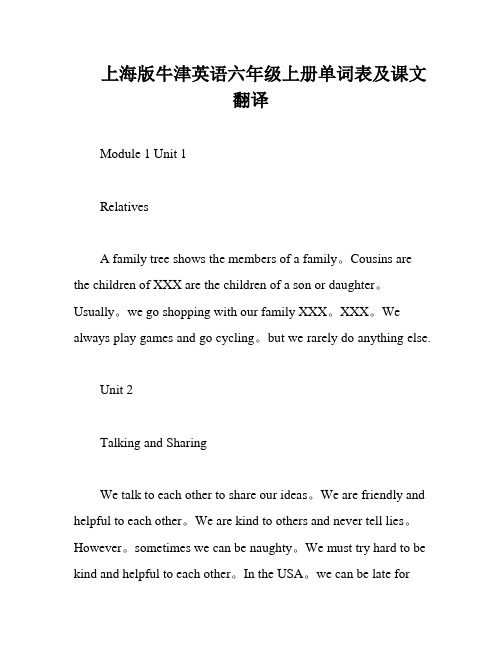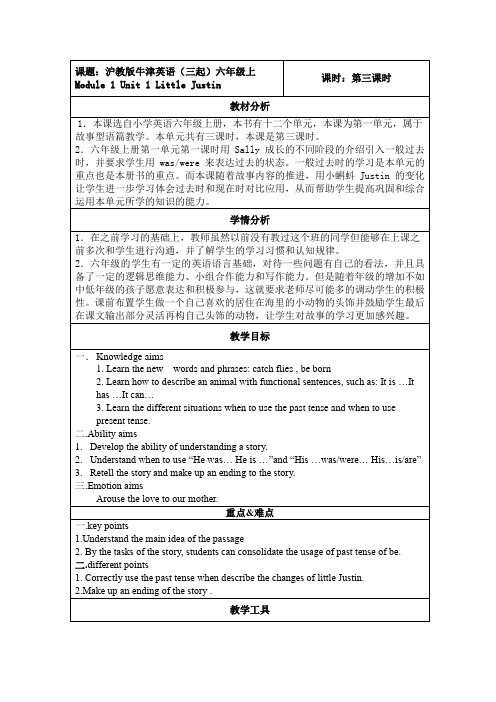上海版牛津英语六年级上unitunit课本解析
牛津沪教版六年级上6A-Unit 1 知识点梳理 + 拓展阅读

6A Module 1 Family and friendsUnit 1 Family and relatives知识点梳理I. Useful words and expressions1. family与relativesfamily通常指自己的父母、兄弟姐妹等成员。
Relatives指的是除此之外与自己有血缘关系或非血缘关系的亲属。
2. 中英家庭称谓区别grandfather: 祖父,外祖父;grandmother: 祖母,外祖母;uncle: 叔父,舅舅,姨夫,姑父;aunt: 姑姑,姨母,婶婶,舅母;cousin: 堂兄弟姐妹,表兄弟姐妹;3. Alice has got a lot of presents and birthday cards from her family and relatives.a lot of 许多大量,后面加可数名词复数或不可数名词,相当于lots of。
get sth. from sb.: 从某人那里得到某物。
4. These are my uncles and this is my aunt.在介绍人物时,常用this is或these are这种句型,而不用使用he/she is, they are句型。
5. – Alice, what do you do with your aunt? – I usually go shopping with my aunt.问句中出现的第一个do是助动词,用于对实意动词的一般疑问句提问,其否定句形式是don’t。
同样作用的助动词还有does和did。
go shopping 去购物。
动词go后面跟动词时,常常接动词的-ing形式。
e.g., go swimming去游泳go cycling去骑车go fishing去钓鱼go camping去野营6. I always play football with my father.动词play后直接跟球类运动时,不需要加定冠词the。
上海版牛津英语六年级上册单词表及课文翻译

上海版牛津英语六年级上册单词表及课文翻译Module 1 Unit 1RelativesA family tree shows the members of a family。
Cousins are the children of XXX are the children of a son or daughter。
Usually。
we go shopping with our family XXX。
XXX。
We always play games and go cycling。
but we rarely do anything else.Unit 2Talking and SharingWe talk to each other to share our ideas。
We are friendly and helpful to each other。
We are kind to others and never tell lies。
However。
sometimes we can be naughty。
We must try hard to be kind and helpful to each other。
In the USA。
we can be late forappointments。
but we should always be kind and helpful。
We should be XXX.Unit 3XXXWe spend our weekends visiting places like the Summer Palace。
the Palace Museum。
Tiananmen Square。
the Great Wall。
and the Temple of Heaven。
We take photographs of these XXX。
We plan our trips and have many ideas about where to go next。
牛津上海版(三起)六年级上册英语 Module 1 Unit 1 Growing up第三课时Little Justin

2.Make up an ending of the story .
教学工具
videos, powerpoint, pictures,new words cards
教学目标
一.Knowledge aims
1. Learn the new words and phrases: catch flies , be born
2. Learn how to describe an animal with functional sentences, such as: It is …It has …It can…
2.Show a picture about tadpoles’eggs and tell students when tadpole was born he was an egg.
3. Encourage students to describe the features of an egg, such as: small and black , a long tai.
.
Students can describe the egg and tadpolewiththe sentences:
He is…
His head is…
He can/has…
从视频到图片到简单问题,一步步循序渐进易于学生回答。
首先通过熟悉的句型描述蝌蚪和卵的外貌特征,为后面出现过去时对比句型做铺垫。
5. Watch the video and see what really happens. Before watching
沪教牛津版六年级英语上册全册知识点点汇总

沪教牛津版六年级英语上册全册知识点点汇总沪教牛津版六年级英语上册全册知识点汇总Module 1 Getting to know each other一、核心词汇1.表示时间名词:month 一个月的时间;月份yesterday 昨天2.形容词:cute 可爱的pretty 漂亮的handsome 英俊的;帅气的famous 著名的;出名的healthy 健康的;有益于健康的unhealthy 不健康的;损害健康的3.动词:catch 逮住;捕捉spend 度过pick 采摘4.食物名词:hamburger 汉堡包fruit 水果pie 馅饼pizza 比萨饼cola可乐sandwich三明治vegetable 蔬菜chicken 鸡肉chocolate 巧克力5.表示动物名词:turtle 乌龟fly 苍蝇6.其他:during 在……期间everyone 每个人;所有人countryside 乡村;农村7.核心词组:grow up长大;成长junior high school 初级中学(be)born 出生summer holiday 暑假the Great Wall 长城the Palace Museum 故宫博物院Tian’an men Square 天安门广场go swimming 去游泳go to the museum 去博物馆go to the cinema 去电影院junior high school 初级中学do my homework 做我的家庭作业watch TV看电视visit my friends 拜访我的朋友 a little 少量的fish and chips 炸鱼薯条二、了解词汇1.一些动词及过去式:go(去)—went do(做)—didhave/has(有)—had watch(观看)—watchedvisit(访问;探望)—visited am/is(是)—was are(是)—were2.一些食物名词:egg 鸡蛋bread 面包noodles 面条dumplings 饺子3.其他:menu菜单三、核心句型1.Her hair was short and her eyes were big. 她那时头发很短而且眼睛很大。
沪教版牛津英语(三年级起点)六年级上册 Module 1 Unit1 教学设计

沪教版牛津英语(三年级起点)六年级上册Module1Unit1教学设计课文标题Little Justin
教材版本
沪教版牛津英语(三年级起点)
六年级上册单元名称
Module1Getting to know each other
Unit1Growing up
单元课时
Read a story
(第三课时)
授课对象六年级学生
授课材料
2.Watch and think
Help students know the scientific answer to the question“Why does his mum leave him alone?”.
带领学生深入了解青蛙的习性。
3.Act it out
Act out the story in groups.
通过表演故事,加深学生对Justin成长演变过程的认识,使学生对故事框架的认识更深刻,同时促进学生的综合语言表达能力。
4.Let's summarize
揭示故事的主题,
鼓励学生感受变化,享
受成长,体验生命的奇
妙。
Step4Homework 1.Find out the answer to the question“Do all the tadpoles become frogs?”.
2.Read the story Little Justin and share it with your parents.。
上海版牛津英语六年级上unit1 unit2课本解析教学文案

上海版牛津英语六年级上u n i t1u n i t2课本解析1.Alice has got a lot of presents and birthday cards from her family andrelatives.(1)...have got... I think I have got one.现在完成时结构have got在口语中相当于一般现在时have的意义,表示“有”。
不过,在美国英语中常用have,而在英国英语中则常用have got。
他有一个兄弟。
He has got a brother.(英式)=He has a brother.(美式)◆现在完成时结构只有一种疑问方式,即:Have/Has...got...?◆而一般现在时结构有两种疑问方式,即:Do/Does...have...?或Have /Has...?你有一把雨伞吗?①Have you got an umbrella?②Do you have an umbrella?③Have you an umbrella?注意这两种结构疑问句的回答略有不同。
①—Have you got a dictionary?—Yes,I have./No,I haven't.②—Do you have a dictionary?—Yes,I do./No,Idon't.考点链接1.Do you have a motorbike?(同义句)→ you a motorbike?2.I don't have a mobile phone like that.→I a mobile phone like that.(2) a lot of = lots of +可数名词复数/不可数名词I have a lot of friends.= I have lots of friends.There is a lot of water in the glass . = There is lots of water in the glass.(3) 介词from2.How many uncles do you have?How many+可数名词复数+do/does+主语+have(how many在句首,名词复数跟着走)How many的用法:1)there be句型中主语的数量,如some,five,only one等提问时,如果是可数名词,不管是单是复都当复,因为说话人不知道具体的数量,而many只能接可数名词复数,所以be一定要用areHow many+可数名词复数+are there+地点或时间状语There is a book on the desk. How many books are there on the desk?There are seven days in a week. How many days are there in a week? How much的用法:1)询问事物的数量,接不可数名词How much milk isthere in the glass2)询问事物的重量 How much does the pig weigh?3)多少钱 How much is the eraser?4)询问数字计算的结果,相当于what. How much is three plus one?1. ____________ meat do you eat every week?2. ____________ students are there in your class?3.________ the pants? They’re 15 yuan.A.How many is B.How many are C.How m uch is D.How much are3.I usually go shopping with my aunt.(1) always 总是usually 通常often 经常sometimes有时候 never从不表示频率,在句中可看做是插入语。
牛津上海版英语六年级上教材梳理及练习 Unit2

Unit2一、词汇Words1. almost adv.(1)几乎【例句】Dinner is almost ready.(2)实际上,简直(用于no, nobody, none, nothing, never 之前)【例句】Almost no one believed him.【辨析】almost / nearly相同点:“几乎,将近,差不多”,当于动词、副词、形容词及名词连用时,意义接近,可互换。
【例句】It's nearly lunchtime.= It's almost lunchtime.2. never adv. 从不; always adv. 总是,一直【例句】She is always friendly and helpful.She always works hard.She is never late for school.She never gets angry.注意always 和never在句中的位置,它们都是副词常用于be动词之后、行为动词之前。
3. each other 互相,彼此【例句】Mary and Kitty always help each other.【常见词组】learn from each other 互相学习know each other 互相认识help each other 互相帮助【知识链接】each other 仅用作动词或介词的宾语,不可做主语。
【用法提示】each other 用于两者,one another 用于三者或三者以上。
each other one another(选词填空)I help you. You help me. We help __________.They three sat side by side and talked with ___________.4. friendly adj. 友好的【用法提示】friendly 常与介词to 和with 搭配构成词组1)be friendly to sb.“ ... 对某人友好”或“ 对某人友善”,指对别人的态度友好,相当于be kind to sb. 【例句】Our English teacher is friendly to us.=Our English teacher is kind to us.2)be friendly with sb. “ 和某人关系友好” 或“ 与某人要好”, 指的是两者的关系。
沪版牛津英语六年级上知识点

知识APleaSUre GroUP OffiCe [T985AB-B866SYT-B182C-BS682T-STT18]MOdUIe 1 FamiIy and friendsUnit 1 Family and relatives1. family and relatives家庭和亲戚 2. a family tree —个家谱3. grandsons and granddaughters 孙子和孙女们/夕卜孙和外孙女们得到许多礼物 从某人那儿得到一张生曰卡 我的家庭成员之一仅仅有一个阿姨 我的同班同学 去购物 其他什么 打羽毛球去骑自行车去游泳两个堂/表兄弟/妹多少…… 1. ThiS is my grandfather.这是我的(外)祖父。
TheSe are my family and relatives.这些是我的家人和亲戚。
4. get a IOt Of PreSentS5. HaPPy Birthday (to sb.) !6. get a birthday Card from sb.7. Olw Of my family members8. Only have One aunt9. my CIaSSmateS10. go ShOPPing11. What else 12. Play badminton 13. go CyCling 14. go SWimming 15. two COUSinS16. how many +名词复数语言点注意句中各成分保持单复数同形。
2. Im their son..我是他们的儿子。
Were their SonS•我们是他们的儿子。
3.HOW ITlany UnCIeS do you have 你有多少个叔叔HOW many后面接可数名词的复数形式。
4.What do you do Witll your…你和你的…干什么5.What else do you do WitlI your…你和你的…还干什么6.What else do you do WitII your...你和你的…还干什么With是个介词,后面接人称代词时,要用宾格的形式。
- 1、下载文档前请自行甄别文档内容的完整性,平台不提供额外的编辑、内容补充、找答案等附加服务。
- 2、"仅部分预览"的文档,不可在线预览部分如存在完整性等问题,可反馈申请退款(可完整预览的文档不适用该条件!)。
- 3、如文档侵犯您的权益,请联系客服反馈,我们会尽快为您处理(人工客服工作时间:9:00-18:30)。
1.Alice has got a lot of presents and birthday cards from her family and relatives.(1)...havegot...IthinkIhavegotone.现在完成时结构havegot在口语中相当于一般现在时have的意义,表示“有”。
不过,在美国英语中常用have,而在英国英语中则常用havegot。
他有一个兄弟。
Hehasgotabrother.(英式)=Hehasabrother.(美式)◆现在完成时结构只有一种疑问方式,即:Have/Has...got...?◆而一般现在时结构有两种疑问方式,即:Do/Does...have...?或Have/Has...?你有一把雨伞吗?①Haveyougotanumbrella?②Doyouhaveanumbrella?③Haveyouanumbrella?注意这两种结构疑问句的回答略有不同。
①—H aveyougotadictionary?—Yes,Ihave./No,Ihaven't.②—Doyouhaveadictionary?—Yes,Ido./No,Idon't.考点链接1.Doyouhaveamotorbike?(同义句)→you amotorbike?2.Idon'thaveamobilephonelikethat.→I amobilephonelikethat.(2) a lot of = lots of +可数名词复数/不可数名词I have a lot of friends.= I have lots of friends.There is a lot of water in the glass . = There is lots of water in the glass.(3) 介词frommany uncles do you haveHow many+可数名词复数+do/does+主语+have(how many在句首,名词复数跟着走)How many的用法:1)there be句型中主语的数量,如some,five,only one等提问时,如果是可数名词,不管是单是复都当复,因为说话人不知道具体的数量,而many只能接可数名词复数,所以be一定要用areHow many+可数名词复数+are there+地点或时间状语There is a book on the desk. How many books are there on the deskThere are seven days in a week. How many days are there in a weekHow much的用法:1)询问事物的数量,接不可数名词How much milk is there in the glass2)询问事物的重量How much does the pig weigh3)多少钱How much is the eraser4)询问数字计算的结果,相当于what. How much is three plus one1. ____________meat do you eat every week2. ____________ students are there in your class’re15yuan.A.HowmanyisB.HowmanyareC.HowmuchisD.Howmuchare usually go shopping with my aunt.(1) always 总是usually 通常often 经常sometimes有时候never从不表示频率,在句中可看做是插入语。
Eg: He always does his homework carefully.I often go to my grandmother’s house in the weekends.(2) go + V-ing 去做某事go shopping 去购物go cycling 去骑车Go swimming 去游泳(3) with sb 和某人一起。
with后接人称代词时,用宾格形式with用法归纳➢“用……”表示使用工具,手段等。
例如:①We can walk with our legs and feet. 我们用腿脚行走。
②He writes with a pencil. 他用铅笔写。
➢“和……在一起”,表示伴随。
例如:①Can you go to the park with me 你能和我一起去公园吗?②He often goes to the library with Jenny. 他常和詹妮一起去图书馆。
③She liveswithher son. 她和儿子住在一起。
➢“与……”。
例如:I’d like to have a talk with you. 我很想和你说句话。
➢“关于,对于”,表示一种关系或适应范围。
例如:What’s wrong with your watch 你的手表怎么了?➢“带有,具有”。
例如:①He’s a tall kid with short hair. 他是个长着一头短发的高个子小孩。
②They have no money with them. 他们没带钱。
➢“在……方面”。
例如:Kate helps me with my English. 凯特帮我学英语。
4.—— Have you been to Ocean Park yet——Yes, I have already/just been to…/been there.No, I haven’t been to…/been there yet.already,just多用于肯定句中,ever,yet,never多用于疑问句和否定句中。
➢.already意思是“已经”①通常用于陈述句中(放在have和has的后面)②也可用于疑问句,表示期望得到肯定的回答或表示惊异,此时already常在句末。
?她已经找到自行车了?➢yet用法①yet可用于否定句,此时译为“还”;Ihaven’tfoundmyruleryet.②也可以用于疑问句,译为“已经”(放在have和has的后面也可放在句末)Haveyoufoundyourruleryet?你已经找到尺子了吗?➢just只用于陈述句意思是“刚才”(放在have和has的后面)Ihavejustreceivedaletter.➢never用于否定句译为“从不”(放在have和has的后面)I’veneverbeentoBeijing.➢ever用于疑问句译曾经”(放在have,has的后面)HaveyoueverbeentoBeijing 练习:根据汉语提示用适当词的合适形式填空。
.我已经做完家庭作业了。
.他刚吃过饭。
________sungthisEnglishsong?你曾唱过这首英文歌吗?.他们还没有动身。
.我们从来没有听说过这件事。
.飞机已经来了。
.我刚才去邮局了。
.玛丽从未去过长城。
have been to 来过,去过(人已经回来了)have gone to 去或到某地了(人还没回来)注意:遇到四个地点副词时,去掉to (here, there, home, abroad)练习:用have been to,have gone to 填空1)Where is Jim He ______________ to Beijing.2) She has ________ to the will be back in two hours.3) I have ________ to the West Lake. Look, I have taken many photos on it.4) The Whites have _______ to the won’t come back.5) I have ______ to Hong Kong twice.6) Tom has ______ to the WC, so I have to wait for him.7) How many times have you _______ to Shanghai.8) I like the Great Wall, so I have ______ there many times this month.9) Sally isn’t at home, she has ________ to Japan.10) The Blacks aren’t in Shanghai. They have ________ to Beijing together.短语:1. go shopping with my aunt 和我的阿姨去购物each other 互相帮助3. be friendly to sb.对某人友好= be kind to sb4. be late for 迟到5. get angry 生气her food with me 和我一起分享她的食物in 住在sb about sth 询问某人关于某事ask sb to do sth 让某人做某事ask sb not to do sth 让某人不要做某事tell sb to do sth 告诉某人做某事tell sb not to do sth 告诉某人不要做某事promise to do sth 承诺做某事promise not to do sth 承诺不做某事9.What about (= how about)怎么样(加doing)about 谈论talk with sb 和某人谈话,talk to sb.和某人谈话11. keep the environment clean 保持环境干净after 照顾(= take care of )it with your classmates 和你的同学讨论。
